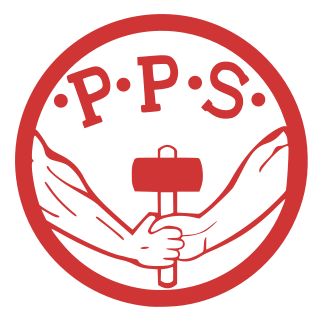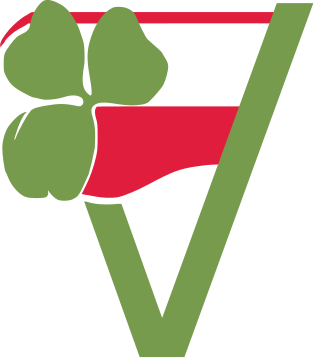 |
|---|
The Polish People's Party "Left" (Polish : Polskie Stronnictwo Ludowe "Lewica", PSL Lewica) was a political party in Poland.
 |
|---|
The Polish People's Party "Left" (Polish : Polskie Stronnictwo Ludowe "Lewica", PSL Lewica) was a political party in Poland.
The party was established by Jan Stapiński on 5 April 1914 as a breakaway from the Polish People's Party. In the January 1919 elections to elect the first Sejm of the Second Polish Republic it received 3.5% of the vote, winning 12 seats. [1] However, the 1922 elections saw it reduced to two seats in the Sejm and fail to win a seat in the Senate.
On 11 May 1924 it merged with a breakaway faction of the Polish People's Party "Piast" to form the Agrarian Union. The new party merged with a faction of the Polish People's Party "Wyzwolenie" and People's Unity to form Stronnictwo Chłopskie in 1926.

The Democratic Left Alliance was a social-democratic political party in Poland. It was formed on 9 July 1991 as an electoral alliance of centre-left parties, and became a single party on 15 April 1999. It was the major coalition party in Poland between 1993 and 1997, and between 2001 and 2005, with four Prime ministers coming from the party: Józef Oleksy, Włodzimierz Cimoszewicz, Leszek Miller and Marek Belka. It then faded into opposition, overshadowed by the rise of Civic Platform and Law and Justice.
The Polish People's Party is an agrarian political party in Poland. It is currently led by Władysław Kosiniak-Kamysz.
The Democratic Party, abbreviated to PD, was a minor social-liberal political party in Poland. It had no members of the Sejm, Senate, or European Parliament.

The Conservative People's Party was a liberal-conservative and Christian-democratic political party in Poland, which was active in 1997–2003 and 2007–2014. In 2014, the party was incorporated into Poland Together.

The Polish Socialist Party is a democratic socialist political party in Poland.

The United People's Party was an agrarian socialist political party in the People's Republic of Poland. It was formed on 27 November 1949 from the merger of the pro-Communist Stronnictwo Ludowe party with remnants of the independent Polish People's Party of Stanisław Mikołajczyk.

Left and Democrats was a centre-left electoral alliance of political parties in Poland which was created on 3 September 2006, before the Warsaw municipal election of 2006. The coalition's aim was to provide an alternative for both Law and Justice and Civic Platform, which have been Poland's two major political parties since 2005. LiD contested their first national election in October 2007 and won 53 seats to the Polish parliament, the Sejm. The LiD alliance was dissolved in April 2008, following a rift between the member parties.

Christian Union of National Unity was an electoral coalition of Popular National Union, Christian Democratic and other right wing parties for the 1922 Polish legislative election.

Poland Comes First, also rendered as Poland is the Most Important, shortened to Poland First, and abbreviated to PJN, was a centre-right, conservative liberal, political party in Poland. It was formed as a more moderate breakaway group from Law and Justice (PiS). By early 2011, the party had eighteen members of the Sejm, one member of the Senate, and three members of the European Parliament. Poland Comes First ceased to exist as a political party in December 2013, when it joined the new centre-right party led by Jarosław Gowin named Poland Together.
The Labour Faction was a Polish Christian democratic political party, active from 1937 in the Second Polish Republic and later part of the Polish government in exile. Its founders and main activists were Wojciech Korfanty and Karol Popiel.

Polish People's Party Nowe Wyzwolenie also known as the Polish Peasant Party Nowe Wyzwolenie was a political party founded in Warsaw on 9 June 1946 in Poland soon after the defeat of Germany in World War II. PSL "Nowe Wyzwolenie" formed a few months before the USSR took political control over the country, and was a Polish Worker's Party (PPR) inspired split from the Polish People's Party (PSL) opposed to the Deputy prime minister Stanisław Mikołajczyk.
The Catholic People's Party was a political party in Poland.
The Agrarian Union was a political party in Poland.

The Polish People's Party – Peasants' Agreement, commonly known simply as Peasants' Agreement (PL), was an agrarian and Christian-democratic political party in Poland.

The Labour Party is a minor political party in Poland. It was formally called the Christian-Democratic Labour Party(Polish: Chrześcijańsko-Demokratyczne Stronnictwo Pracy, ChDSP) between 1989 and 2000. The party continued the traditions of the pre-war Labor Party, which ceased its activities in Poland in 1946. This made the party be considered a historical formation, together with the Polish Socialist Party.

Parliamentary elections were held in Poland on 13 October 2019. All 460 members of the Sejm and 100 senators of the Senate were elected. The ruling right-wing Law and Justice (PiS) won re-election to a second term retaining its majority in the Sejm. However, it lost its majority in the Senate to the opposition. With 43.6% of the popular vote, Law and Justice received the highest vote share by any party since Poland returned to democracy in 1989. The turnout was the highest for a parliamentary election since the first free elections after the fall of communism in 1989. For the first time after 1989, the ruling party controlled one house, while the opposition controlled the other.

The Left is a political alliance in Poland. Initially founded to contest the 2019 parliamentary election, the alliance now consists of the New Left and other smaller parties.

Włodzimierz Czarzasty is a Polish politician who serves as the co-chairperson of the New Left party. He has been serving as a Deputy Marshal of the Sejm since 12 November 2019.

The New Left is a social-democratic political party in Poland. It is positioned on the centre-left on the political spectrum. Its leaders are Włodzimierz Czarzasty and Robert Biedroń.